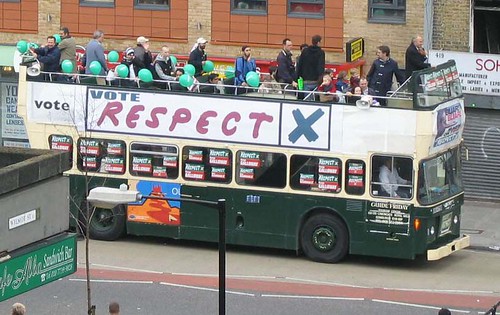 Jonathan Neale, Author, Respect member & National Secretary of the Campaign against Climate Change writes that the Climate Change Bill doesn't go far enough and urges the movement to step up the pressure
Jonathan Neale, Author, Respect member & National Secretary of the Campaign against Climate Change writes that the Climate Change Bill doesn't go far enough and urges the movement to step up the pressure
Gordon Brown is in competition with David Cameron as to which party takes global warming more seriously.
While neither is prepared to break with the neoliberal policies which fuel climate change, the government’s draft bill, unveiled last week, should not be dismissed.
The fact that there is a bill in the first place is an important victory for all those who have been fighting to get government action.
Despite having some important defects, the bill has won qualified support from leading figures in the environmental movement.
It sets a target of reducing Britain’s carbon emissions by 60 percent by 2050. This might sound impressive, but cuts of at least 80 percent are required by 2030.
The reason we need such a rapid and big cut is to prevent unpredictable changes in our climate that will result from the “feedback effect” – which occurs when the increasing temperature of the planet causes still further carbon to be released.
Research into the Greenland ice pack shows that a rise in temperature of above 2 or 3 degrees could be the trigger for the effect.
The other big problem with the bill is that there are a lot of get out clauses – one such clause says the emissions target can be ignored if the cuts are “hurting” the economy.
The bill also focuses on carbon offsetting, in which rich countries obtain the right to pollute by buying carbon credits from poorer countries.
These forms of carbon trading are attempts to get out of reducing this country’s emissions.
It is also unclear what forms of carbon emission will be covered – for example air travel is not covered. Some estimates say targets set by Europe and Britain are only applicable to 50 percent of the emissions they produce.
The bill calls for an independent body to oversee emissions cuts which will include six business people, one scientist and one other (perhaps someone with a social conscience).
But there is no room for an environmentalist, a trade unionist or a climate change activist.
One of the main demands of Friends of the Earth and other climate change campaigners has been for binding annual targets on emissions.
The bill prefers five-year targets, with a gap of 18 months after the deadline for the figures to be looked at, followed by three months for the government to respond. Even if the first target were set tomorrow no one would be held responsible until 2014.
Carbon account
So far everything I’ve said is negative but the fact that we have got this far means that there is a real possibility of a political fight with the government.
The government has stated that the bill will now have a long consultation period – it is unlikely that it will be put to parliament before March 2008.
We should use that year to organise a national campaign that concentrates on forcing annual targets on emissions to be included.
New Labour’s David Miliband talked recently about individual carbon accounts – in which every citizen would have their own personal emissions quota. It is an idea that is very popular with a lot of climate justice activists.
These accounts attempt to sound like Second World War rationing, where everybody had an equal ration, and where the poor ate better than they had done before war.
But key to that system was the inability to sell your ration. With the proposed carbon accounts you can sell your share, enabling the rich to buy the right to carry on living as they do now.
This is not just unfair – it undermines the whole process of reducing emissions. We should force the government to step in.
Manufacturers should not be allowed to make electrical goods with standby buttons, and instead of short haul flights there should be cheap and efficient railways right across Europe.
We should stop people flying halfway around the world for a business meeting, or a one-day shopping trip.
The government should be pressurised into putting money into building and researching alternative methods of power generation.
If research into renewable energy received even a fraction of the funding and subsidies enjoyed by the nuclear industry, the way we produce our power would look very different.
Immediate action from the government is required on sustainable city planning, tough action against corporate polluters and increased investment to make homes energy efficient.
People who cannot imagine a government putting the planet before the economy see carbon credits as a solution.
I can understand their reservations, but we should remember that we have already forced the government to concede more than it wanted to. Now we need demonstrations and public campaigns to gain much more.




 Note: Grassroots campaigner, Paul Lynch, Chair of Swansea Defend Council Housing will be a Respect candidate in the May elections, heading up the list for South Wales West, campaigning for new sustainable council houses to be built & for welfare not warfare.
Note: Grassroots campaigner, Paul Lynch, Chair of Swansea Defend Council Housing will be a Respect candidate in the May elections, heading up the list for South Wales West, campaigning for new sustainable council houses to be built & for welfare not warfare.

 In 1893, Keir Hardie entered parliament. He created a scandal when he insisted on wearing working clothes and a cloth cap instead of the regulation frock coat and top hat.
In 1893, Keir Hardie entered parliament. He created a scandal when he insisted on wearing working clothes and a cloth cap instead of the regulation frock coat and top hat. 


























